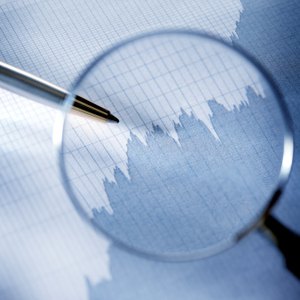
Economics is the field within the social sciences that focuses on trends within the economy. Economists may study the U.S. economy or even the world economy as they try to understand these trends. Economics is typically taught at the college level, although it is sometimes offered as an elective choice for some high school students in preparation for college. An understanding of basic economic terms can aid in your understanding of economic concepts.
Supply and Demand
The terms "supply" and "demand" are two of the most basic and most often used terms in economics, according to The Economist website. Supply and demand are market forces which determine the direction in which the economy moves. Supply refers to how much of a given product or service is available. Demand refers to the level of want or need for a product or service. Both supply and demand work in reciprocity with one another and another important economic term, "price." Price determines supply which, in turn determines demand. Supply also is determined by production. The amount of a product produced can depend on factors such as cost, competition and technology.
Inflation
Understanding inflation is important because doing so can help you understand your purchasing power at the store or other places where you spend your money. Inflation refers to the rise in prices that occurs over the course of time compared with the money supply. Inflation is generally measured as an index number expressed in a percentage. The Economist website notes that inflation is unpredictable.
Interest Rates
In the simplest terms, interest rates typically refer to the amount of money that is paid annually on money that has been borrowed. Economists often use interest rates as a gauge for whether the economy is expanding or contracting. If interest rates are artificially lowered by the Federal Reserve, this usually is an attempt to attract more borrowers and stimulate economic growth, signaling that the economy could be contracting. Higher interest rates indicate strong economic growth.
References
- Economics Wisconsin: Glossary of Economic Terms
- Social Studies for Kids: Economics
- The Economist: Economics A-Z
- University of Missouri: eThemes
- Federation of American Scientists. "The Economic Effects of 9/11: A Retrospective Assessment," Page 16. Accessed March 21, 2020.
- Consumer Affairs. "Consumer complaints about price-gouging post-Sept. 11." Accessed March 21, 2020.
- Federal Trade Commission. "The Antitrust Laws." Accessed March 21, 2020.
- Office of Energy Efficiency and Renewable Energy. "Fact #915: March 7, 2016 Average Historical Annual Gasoline Pump Price, 1929-2015." Accessed March 21, 2020.
- University of California San Diego. "Historical Oil Shocks." Accessed March 21, 2020.
Writer Bio
Jared Lewis is a professor of history, philosophy and the humanities. He has taught various courses in these fields since 2001. A former licensed financial adviser, he now works as a writer and has published numerous articles on education and business. He holds a bachelor's degree in history, a master's degree in theology and has completed doctoral work in American history.

